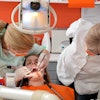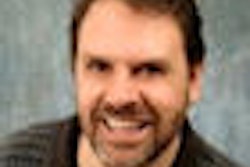
When John Killip, D.D.S., decided to go into teaching, he set off on a path that few dentists had trod before him.
For a long time, virtually the only way to get promoted at U.S. dental schools was through publishing clinical research. Dr. Killip, who came to the University of Missouri-Kansas City School of Dentistry 20 years ago, was one of the first to work his way up to the position of clinical professor without doing that kind of work. "It was during that time that promotion and tenure guidelines began to change," he said.
Now there are many more like him. As dental schools grapple with a faculty shortage, they are opening up more paths to promotion outside the traditional publish-or-perish track, according to a study published in the Journal of Dental Education (March 2009, Vol. 73:3, pp. 375-382).
 |
| Some dental schools are putting more emphasis on teaching ability in deciding which faculty to promote. |
"There's an increase in the ways of retaining faculty," said lead author Elizabeth Pilcher, D.M.D., a professor in the department of oral rehabilitation at the Medical University of South Carolina College of Dental Medicine.
In a tradition going back over a century, many universities require faculty to publish research into the science of dentistry. After about seven years, those whose published work doesn't meet a minimum standard must leave.
At dental schools, that's changing. In a survey of all U.S. dental schools, researchers at the Medical University of South Carolina found that 94% offer nontenure tracks -- up from only 40% in 1980.
Dental schools have always offered positions for faculty who didn't want to do clinical research, Dr. Killip said. Those teachers could keep their jobs if they didn't publish -- but they couldn't advance. What's changed is that the universities now offer opportunities for the clinical faculty to rise to positions of greater responsibility, prestige, and pay.
The alternative tracks vary from one school to another, Dr. Pilcher said. Student and peer evaluations, letters of recommendation, and collaborative ventures with other faculty are among the criteria being used to promote faculty. In addition, many schools are allowing faculty to switch from one track to another. So faculty who set out to publish and fail don't necessarily lose their jobs.
A higher bar
Another trend may push more faculty into alternative tracks; Dr. Pilcher and her colleagues found that the average number of publications required for those on the traditional tenure track has increased. A 1990 study found that an average of 1.5 publications were required for promotion to assistant professor. Dr. Pilcher's team found that number had jumped to 4.75.
Counting publications doesn't capture all the contributions that a dentist can make to a university, according to Dr. Pilcher. "We have to become more diverse in terms of finding ways to evaluate faculty," she said. That's particularly important because dental schools are facing a faculty shortage -- U.S. dental schools have 300 to 400 open positions, she noted.
And the situation could worsen. Many baby boomer faculty are approaching retirement age, but universities can't afford to match the income dentists can make in private practice.
Like Dr. Pilcher, Dr. Killip thinks the trend toward alternative tracks will benefit dentistry. "I'm in favor," he said. "I think it's more realistic. But I'm biased." Dr. Killip, who practiced dentistry for 17 years, came to the University of Missouri to teach. Twenty years later, he spends most of his time on student admissions. He has also worked hard through the American Dental Education Association trying to open another avenue for dental faculty -- promotion based on research into teaching and learning.
In order to publish, faculty need time away from teaching and practicing dentistry to do research, Dr. Killip said, but few grants are available for research into teaching and learning.
The tenure system was designed largely to protect academic freedom. But Dr. Killip said he doesn't think faculty at dental schools are at risk of having their ideas suppressed. "I have not experienced circumstances where a faculty's opinion has been so controversial that tenure was the only thing that kept them in their position."
If there's a downside, Dr. Killip said, it's that less research will be done. "We as a profession are missing out on the important scholarly activity that might lead to positive directions for the profession," he said.
Copyright © 2009 DrBicuspid.com



















